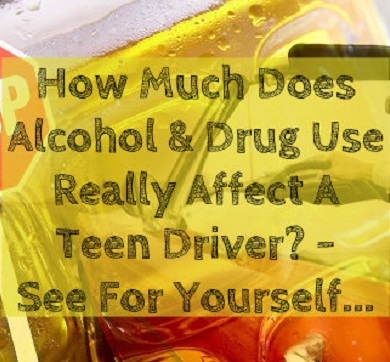Drugged, Drunk Driving And The Drastic Effects On Teens
The long-term risks for teens that abuse substances are increased likelihoods of adult addiction, developing certain cancers or heart disease and engaging in dangerous sexual behaviors that could result in contracting a sexually transmitted disease and/or an unplanned pregnancy. But there are also serious short-term risks, with the most serious being the increased likelihood of getting into a vehicular accident.
In addition, while many teens are advised not to drive a car while under the influence they may not use enough caution when considering the sobriety of another driver.
A recent study highlights the risk teens take when they drive a car or enter the car of a driver that is under the influence. Conducted by researchers at the Mailman School of Public Health at Columbia University, the study examined the risk of drug use and the risk of drug use combined with alcohol use and how such use impacted the risk of a fatal crash.

Drastic Increases In Fatal Crashes When Drugs Are Involved
The researchers found that there was a drastically increased risk of experiencing a fatal crash when drugs were involved in an accident, and this was particularly true when the drugs were used in addition to alcohol.
The study’s data was pulled from two national databases commissioned by the National Highway Traffic Safety Administration: the 2007 National Roadside Survey of Alcohol and Drug Use by Drivers and the Fatality Analysis Reporting System (FARS). FARS compiles investigation information for all vehicular crashes that resulted in a fatality within 30 days of the crash occurring on a public road.
This study is unique in its use of the two databases together to compile information about circumstances surrounding events, such as the individuals and vehicles involved.
The study, led by Guohua Li, MD, DrPH, professor of Epidemiology and director of the Center for Injury Epidemiology and Prevention, found that 31.9 percent of all drivers implicated in fatal crashes tested positive for at least one drug. Of those interviewed at roadside, 13.7 percent tested positive for at least one drug. Overall, drivers that test positive were three times more likely to be involved in a fatal car crash, with the highest risk associated with depressants followed by stimulants.
The study also showed that blood alcohol levels were increased in 57 percent of those involved in fatal crashes, while 8.8 percent of the roadside interviews had an elevated blood alcohol level. Approximately 20 percent of the fatal crash drivers tested positive for alcohol consumption and one or more additional drugs. Among the roadside interviews, 2.2 percent tested positive for alcohol and another drug.
Alcohol Increases Fatal Car Crashes By 13 Times!
The risk of involvement in a fatal car crash increased 13 times for those that tested positive for alcohol only, two times for those that were drug-positive and 23 times for drivers that were under the influence of both drugs and alcohol.
The authors of the study note that drugs may be detectable in a driver’s blood test that may not be causing impairment. In addition, the authors say that the study does not account for various levels of tolerance that may be exhibited among individual drivers, making it difficult to measure drug impairment.
Decreased Risks When Parents Talk With Their Teens
The findings highlight the importance of talking with teens about the risks of driving a vehicle while under the influence or entering a vehicle in which the driver has been using.
Parents that explain the risks and dangers can help their child make an informed decision.



